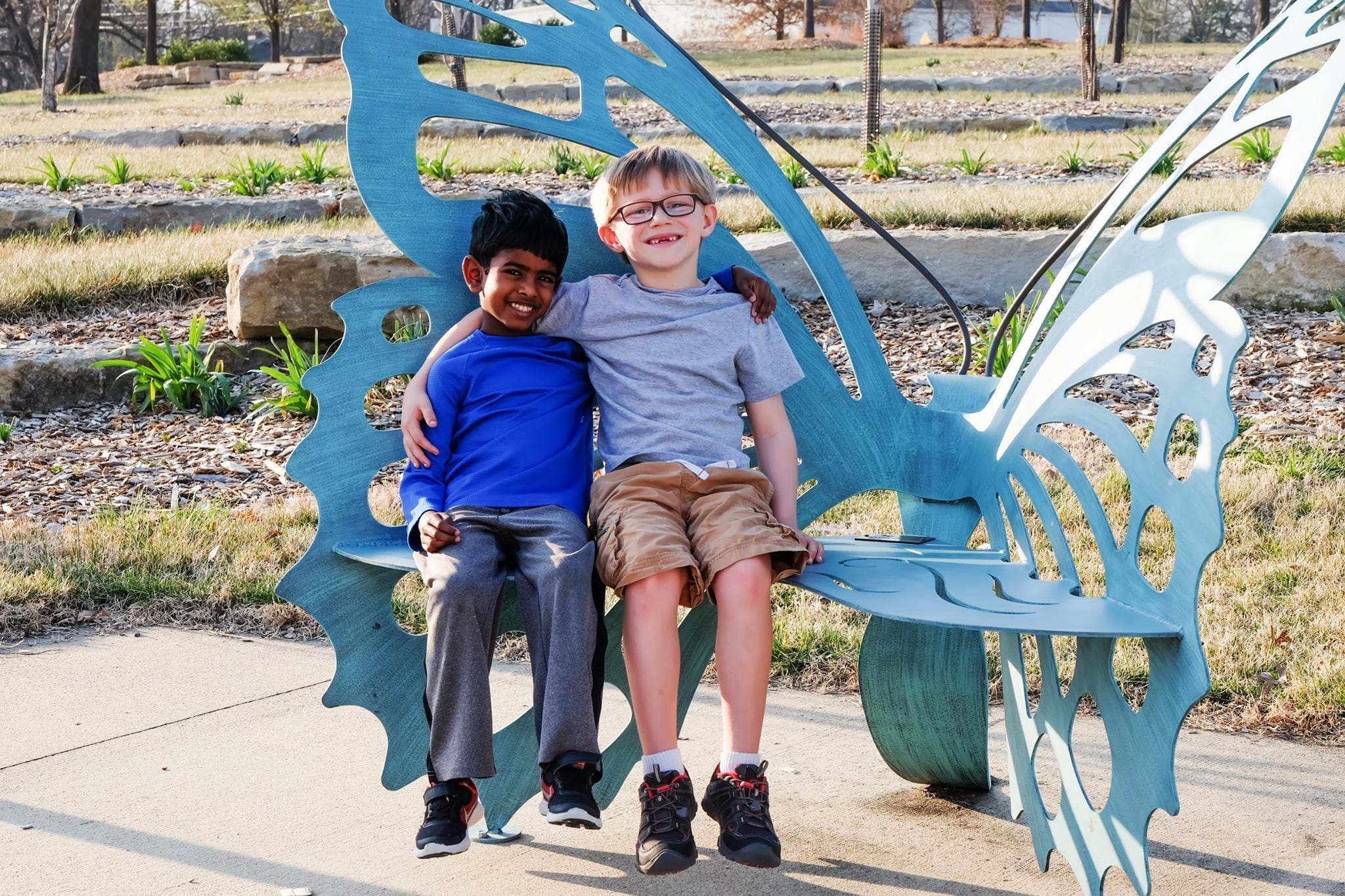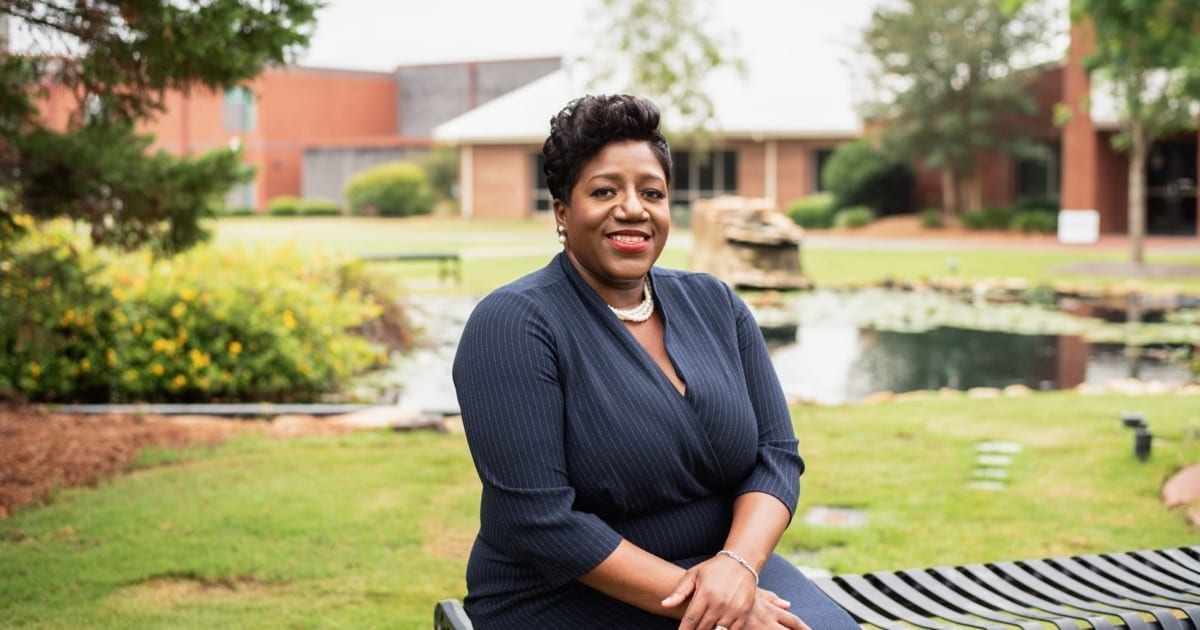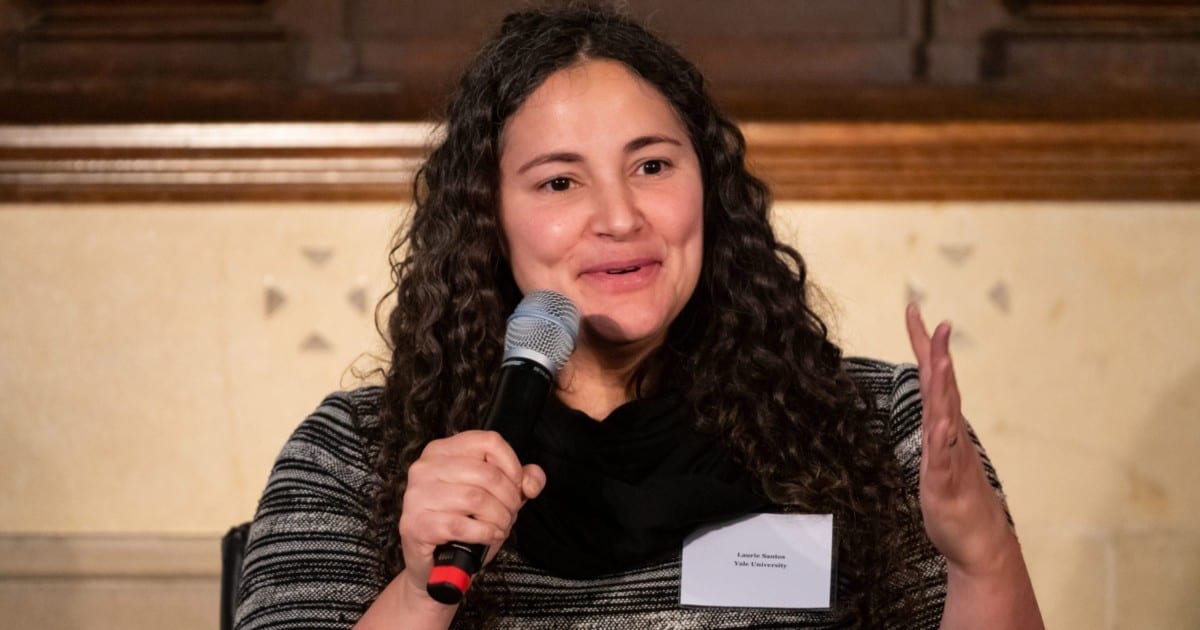The Children’s Grove: Where Kindness and Mental Health Meet
The Children’s Grove in Columbia, Missouri, started out as a memorial to victims of violence, but over the years it has transformed into a kindness incubator contributing to the emotional and mental wellbeing of children and young adults, from pre-school to university.
The Grove itself is a section of a downtown park lined with butterfly magnolia trees and butterfly-sculptured benches – a nod to the “butterfly effect” where small changes, like a single act of kindness, can have a large impact. This happy place that attracts families throughout Boone County was built to honor the memory of the 26 people, mostly children, who died in 2012 in the tragedy at Sandy Hook Elementary School in Newtown, Connecticut.
“As a community, we were aching with the loss of all of those children and we just kept looking at one another saying, ‘what can we do not just to honor those that were lost, but also for our own children?’” said Dr. Anne Deaton, who founded the Grove.
Deaton formally served as director of Missouri’s Division of Developmental Disabilities and was particularly concerned about mental health issues. She is the wife of Dr. Brady Deaton, who was then chancellor of the University of Missouri, whose main campus is in Columbia. She turned to her fellow citizens to create some form of memorial to bring the community together.
“We asked ourselves, ‘How can we be there for our children in ways that are important to their social, emotional and mental health and increase the public’s understanding of the hardships they often face?’” she said.
Deaton said the response from the community was immediate and generous and, within three months, they had the money and the space for the Children’s Grove. At the groundbreaking, citizens turned out in droves.
“We talked about the simple trunks of those trees being like the determination of the adults in our community to stand up for our children and children everywhere,” she said.
Once the Grove was established, Deaton formed a committee and drafted a two-pronged mission for what would soon grow into a non-profit organization: to promote a culture of kindness and to support the emotional and mental wellbeing of children and teens.
“We had a very strong conviction about kindness and mental health because we understood how closely they were linked,” Deaton said. “Our operational definition of the attributes of kindness are mutual respect, sincere compassion, and meaningful inclusion. All of those connect to the social, emotional, and mental wellbeing of young people.”
From Place to Programs
The group immediately explored how to use resources within the community to achieve its mission. Nearly eight years later, the mark of the Children’s Grove is seen throughout Columbia and into the rest of Boone County, with both physical symbols of kindness as well as school and community programming that leaders hope have made a difference.
Kim Dude is the current president of the Children’s Grove. She has a background in behavioral health with a focus on alcohol and drug abuse prevention and spent 38 years at the University of Missouri, where she started the Wellness Resource Center.
Dude said she is continuously amazed at how much the organization can accomplish with their all-volunteer staff. Their annual “Kindness Week” in April – featuring wrist band campaigns, kindness booths, and appreciation ceremonies – was cancelled this year due to COVID-19. But many of their other programming is ongoing, like the Kindness Library, where each year the best children’s books on kindness are collected and delivered to schools throughout the county.
Much of their work focuses on public art that promotes kindness. Its latest example is two butterfly murals painted on buildings in downtown Columbia by young artists from the community. Both murals are of a butterfly’s wingspan, one large, one small, allowing children and adults to step into the center. They are accompanied by the phrase “Kindness Changes Everything.”
“We want people to know that what they do and how they treat others can have a positive effect way beyond what they can even imagine,” said Dude.
For the Children’s Grove, symbolic messaging meets tangible impact with the work of the Youth Kindness Ambassadors, a.k.a., YKA. Organized through the Children’s Grove, this corps of high school students has been spreading kindness among their peers for over five years, each class contributing new ways of letting teens know they are not alone.
Yash Pal Khanna was named one of the two founding Youth Kindness Ambassadors by the Mayor of Columbia in 2018 after he and another student started the first chapter at Rock Ridge High School. He is now studying to be a doctor. Mental health remains a priority for him, as does volunteering and community organizing, all of which he says he learned from the Children’s Grove.
“I believe that because of YKA’s influence in our high schools, students found a platform to be creative and to spread their ideas on how to help the community,” he said. “The initiatives I later started were all a result of a culture and foundation provided by the Children’s Grove.”
There are currently over 50 active Ambassadors who carry out much of the work the Children’s Grove has developed, attending events promoting kindness, reading to children from the kindness library, and working in a variety of offshoots, like suicide prevention initiatives and mental health awareness activities.
Khanna believes school programs like the YKA are critical to the healthy development of teens.
“Students developing in a culture that promotes kindness, diversity, and inclusion are being exposed to positive ideology early on. This is how caring school atmospheres are made – this aspiration to cultivate good works in the form of less bullying, more volunteering, more inclusion and more empathy.”
Lydia Olmsted, a current Kindness Ambassador, is a good example of the Children’s Grove version of “paying it forward.” Asked why she got involved in the group, she said, “At one point, I was going through some challenging times, but was able to overcome them when someone was very kind to me. After that, I wanted to spread kindness to others because it had changed my life.”
Nadia Lake joined the Youth Kindness Ambassador program her freshman year in high school but didn’t get really involved until her sophomore year when she stepped in to fill a void in leadership at her school. Since then, she has been organizing events and attracting new members.
“For most students, high school is a rough time,” she said. “Small acts of kindness can break through angst and create a more positive environment in school.”
Lake referred to one program called the “Caught Being Kind Project” that celebrates people who have shown kindness to others by putting their ceramic handprint on a wall next to a “People you can look up to” mural.
“I want our school to celebrate our kindest students just as we celebrate our amazing athletes and brilliant students,” she said.
As to the impact of these programs, Olmsted said, “When we host events in the community and at schools, I am always amazed by how many people come up to us and say how much they enjoyed the event and want to get involved in the Children’s Grove. I think that just goes to show how contagious kindness is.”
Every year during Kindness Week, the Children’s Grove celebrates their Ambassadors with a block party and award ceremony with the mayor and superintendent of schools. This year, Dude organized a lawn sign campaign instead due to COVID-19.
One student had just returned home after losing her grandmother when she saw the sign on her lawn celebrating her role as a Kindness Ambassador. Her mother told the Children’s Grove volunteer, it meant the world to her daughter.




